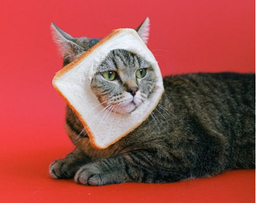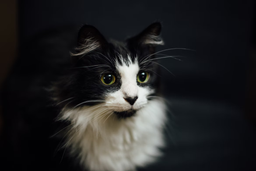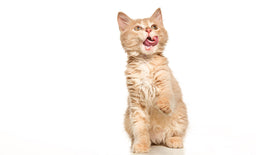If your cat’s not eating much but acting normal, here’s what it could mean
Did you notice your cat eating less than usual or avoiding food completely but still acting lively and energetic? There are many reasons a cat could skip a meal, but if that is a frequent occurrence, it’s time to investigate it.
We’ll explore the reasons behind a cat not eating much but acting normal and help you determine whether you should take your furry friend to the vet.
We’ll tackle the following questions:
- What are the essentials of a healthy cat diet?
- Why are consistent eating habits important?
- How do the factors mentioned above impact your cat’s lack of appetite?
Why is my cat eating less but acting normal?
The reasons why cats skip meals are as follows:
- Aversion to a particular type or brand of food
- Lack of appetite because they ate already
- Early stages of an undiagnosed disease
- Recent vaccination
- Stale food
- Medication
- Anxiety
Signs your kitty doesn’t like their food
Do you suspect that your kitty doesn’t enjoy that wet food you carefully picked out?
Here are some tell-tale signs the product is not their cup of tea:
|
A cat who likes their food |
A cat who doesn’t like their food |
|
|
Cats who don’t like their food are more likely to skip meals. If you suspect your kitty isn’t delighted with your choices, you can always:
- Introduce cat biscuits of various sizes and flavours as a taste enhancer
- Buy different kinds of canned food
- Mix wet and dry food
- Add water, soup, or broth to your feline’s meal
How to know whether your cat ate already
Outdoor cats are excellent at finding extra food if they spend much energy during the day. If your furry friend had lunch outside, they will often skip the meal you offer when they come back home. Keep in mind that skipping more than one meal indicates another cause behind the loss of appetite.
Indoor cats don’t spend as much energy as outdoor felines, so their daily food intake is slightly lower. Unlike dogs (and pet parents, sometimes), cats don’t feel the need to eat as long as there’s food in sight. If your kitty already got a meal from one of your housemates, they will probably skip the one you offer.
To keep track of how much your cat eats, create a feeding schedule and plan meals with your housemates or family members to avoid wasting food.

What do you mean dad fed me already? Moooooom?
Source: _hiuyau_
Diseases that could cause the loss of appetite with no behavioural changes at the beginning
The early stages of some medical conditions can cause appetite loss but no other accompanying symptoms right away.
You can find more details in the table below:
|
Category |
Diagnosis |
|
|
Infections |
Fungal:
Bacterial
Viral:
Parasitic:
|
|
|
Inflammation |
|
|
|
Organ failure |
|
|
|
Metabolic disease |
||
How can vaccination impact your cat’s appetite?
Vaccines are undoubtedly lifesavers, but they sometimes cause slight side effects. One of them is a short-term loss of appetite. Some veterinarians and cat parents say that they’ve noticed disinterest in food in cats who got vaccinated for rabies, FVRCP diseases (Feline Viral Rhinotracheitis, Feline Calicivirus, and Feline Panleukopenia), and FLV (Feline Leukemia Virus).
If your kitty got vaccinated and doesn’t feel like eating right away, monitor them and see how they feel later in the day. In case they reject food for more than 24 hours, it’s time to take them to the vet as something more serious might be going on.
Stale food is a turn-off for cats
Cats notice the slightest change in their food taste. Their sense of smell is sharp, and they'll whiff anything fishy quicker than you.
You can efficiently resolve this issue by:
- Buying smaller packs of food
- Keeping cat biscuits in airtight containers
- Throwing out any opened wet food that’s in the fridge for longer than five days and any opened pack of biscuits older than 14 days
Can medication cause a loss of appetite in cats?
Some medication causes a short-term loss of appetite in cats.
Check out the common feline medicines that often entail disinterest in food in the following table:
|
Type of medication |
Examples |
|
Antibiotics |
Clavamox, amoxicillin, and orbax |
|
Pain medicine |
Gabapentin, robenacoxib, and buprenorphine |
|
Anti-parasitics |
Dewormers and flea and tick repellents |
|
Over-the-counter supplements |
Vitamins, herbal medication, and nutritional supplements |
|
Hypertension medicine |
Amlodipine and propranolol |
How is anxiety connected to the loss of appetite in cats?
Cats feel anxious when they sense danger. In such situations, felines are on high alert, and food isn’t their primary concern.
You can learn more about the common causes of anxiety in cats in the table below:
|
Environment-related |
Food-related |
Animal-related |
|
|
|
If any of the above coincides with your cat's loss of appetite, it's probably stress-related. Symptoms of anxiety may include:
- Excessive miaowing
- Hiding
- Avoiding the litter box
- Mood swings
- Changes in activity (lethargy or restlessness)
You can reduce the stress by keeping their favourite area intact or cuddling them to make them feel safe.

Is the repairman gone yet?
Source: paisleythesiberian
Should a cat eating less but acting normal still be examined by a vet?
If your cat skips their meals regularly, you should take them to the vet to determine why.
Food rejection in kittens and senior cats is particularly dangerous due to their sensitive bodies, so the cause must be discovered and resolved as soon as possible.
A cat that doesn’t eat at all for 24 or more hours may suffer from anorexia, while felines who skip meals occasionally can be partially anorexic. Partial or not, anorexia is life-threatening for cats—the only difference between the two is that partial anorexia takes several weeks to do visible damage.
Anorexic cat’s liver starts to draw energy from fat deposits and quickly switches to proteins once the fat is spent. After protein supplies deplete, the remaining fat in the feline’s body overwhelms the liver. It results in significant liver damage and a condition called hepatic lipidosis. If the liver gets damaged, the kidneys, pancreas, and cardiovascular system suffer, too.
The damage done to the liver is irreversible unless treated with a strict diet and medication. The treatment lasts around seven weeks in severe cases.
What does the treatment of feline anorexia entail?
Veterinarians make sure that every potentially anorexic cat:
- Receives intravenous fluids for rehydration and nourishment (a feeding tube is inserted if the cat hasn’t eaten for three days or more)
- Undergoes full diagnostics to determine the cause
- Receives treatment for the diagnosed condition and supportive therapy
Typical diagnostic methods include:
- Complete blood count (CBC)
- Blood chemistry panel
- Thyroid testing
- Urinalysis
- Radiographs
- Ultrasound imaging
The vet will also ask you about what happened in the days before food rejection to determine potential stressors or allergens that could have had an impact on your cat’s eating habits (in case of allergies, the vet will introduce a hypoallergenic diet).
Exact methods depend on the reason why your cat rejects food and their reaction to different types of treatment, but supportive therapy typically includes:
- IV fluids (rehydrate, nourish, and help cats receive medication)
- Antacids (counteract the acids in your cat’s stomach, relieving indigestion and heartburn)
- Steroids (reduce inflammation)
- Anxiolytics (if your cat’s anorexia is stress-induced)
- Pain medication
- Appetite stimulants
- Anti-nausea medication
After initial treatment and release from the veterinary hospital, cats are often put on a strict diet. The vet will most likely instruct you to bring your furry friend back for reevaluation periodically.
Under no circumstances should you try to treat your cat’s anorexia yourself or resort to over-the-counter medication before consulting your veterinarian. Anorexia is life-threatening, and the wrong treatment could be detrimental to your cat’s well-being.
How to get your furry friend back on their feet
After successful therapy, the vet will instruct you to feed your cat smaller portions more frequently to prevent nausea.
You can motivate your kitty to eat by:
- Serving their favourite food
- Warming the meals to room temperature or slightly higher to enhance the smell and taste
- Using a shallow dish, so they don’t get their whiskers wet (whiskers are an essential part of their sensory equipment)
- Putting the dish as far away from the litter box as possible, in a secluded area with no stressors
- Gently stroking their back for comfort
Veterinarians also advise putting away the dish between meals.

What is that cat looking at?
Image (c) Untamed
What to feed a cat who’s been avoiding food
The following table lists the essential nutrients making a healthy feline diet:
|
Nutrient |
Percentage of daily intake |
|
Protein |
Over 50% |
|
Fat |
Up to 20% |
|
Water |
Around 70% |
The approximate daily food intake for cats should be around 40–45 calories per kilo of their body weight. Your vet can recommend adequate portions for your feline.
Feeding your cat with nutritionally suboptimal food can negatively affect their health in the long run. If you’re unsure whether a particular brand or diet meets these requirements, you can always consult your vet to develop a tailor-made meal plan.
Cat food go-tos
Check out the best sources of protein, fat, vitamins, and minerals with the highest bioavailability index for felines in the table below:
|
Ingredient category |
Ingredients |
|
Poultry |
|
|
Fish |
|
|
Crustaceans |
|
Cats thrive on whole meat (the liver is the only organ that can benefit your cat’s health) to keep their vitamin and mineral supply in order. You can also include a slice of lean deli meats (such as ham) as an occasional treat. One of the essential amino acids for cats, taurine, can only be found in meat.

Mom, are these for lunch or just photo props?
Image (c) Untamed
Cat food no-nos
You should avoid giving your cat the following food:
- Raw food (such as meat or eggs)—Raw chicken or bones might seem like a nice treat for your kitty, but the products we buy cannot compare to the fresh prey wild cats hunt because they can be contaminated with various bacteria and parasites
- Fruits and veggies—Cats can enjoy an occasional treat or two, but keep in mind that cats are obligate carnivores. The feline digestive system isn’t designed to handle plant-based food, which is why a vegan diet is not only suboptimal but even harmful to cats
- Milk and dairy products—Milk and dairy are bad because of lactose and casein (which can cause allergic reactions). Yoghurt is not that bad but should be fed in moderation
- Most human foods—Cats and humans don’t have the same digestive tracts, so we benefit from different food types. Keep in mind that the optimal source of nutrition for cats is meat, so skip on human snacks, such as chocolate, bananas, strawberries, or any other
- Products containing animal derivatives—Derivatives (often referred to as byproducts) are leftovers from the human food industry that typically include organ meat, beaks, hooves, feathers, etc. Many manufacturers use them as cheap fillers to boost their meat percentage
- Grain and cereals—Cats don’t need carbohydrates because they get their energy from protein and fat (to a lesser extent). You should keep your feline's carb intake below 3%
- Which cat food should you go for?
Most cat food on the market falls under the following categories:
- Dry food—Cats and their parents typically love dry food. Felines because of its taste and texture and humans because it's cheap. In most cases, dry food isn’t nutritionally sufficient and must be complemented with wet food
- Wet food (jelly and gravy products)—The closest you can get to a natural feline diet. Wet food keeps your cat hydrated and supports digestion
- A mixture of dry and wet food (either as separate meals in the day or mixing them in every meal)—It’s a way to let your kitty get the best of both worlds without compromising their health
Semi-moist cat food often contains too much salt, sugar, preservatives, and artificial colouring and flavouring, so you ought to avoid feeding it to your cat during recovery (or at all).
Homemade food is a viable option only if you consult your vet about the appropriate ingredients and nutritionally adequate recipes. The downside is that it requires time and money to be optimal.
Untamed—helping your cat become and stay healthy
Our goal is to provide everything a cat needs to stay happy and healthy, and we do so by using:
- Sustainably farmed meat
- Fish and crustaceans from dolphin-safe suppliers
- Finest human-grade ingredients
- Minimum processing to keep the taste and nutritional value of the ingredients
Untamed is suitable for cats of all:
- Life stages—Kittens, adults, or seniors enjoy our vet-formulated because they help your kitty thrive throughout their life. Pregnant queens and neutered males also love our dishes
- Breeds—Whether a Bengal, Persian, Ragdoll, Siamese, Maine Coon, British Shorthair, or any other breed, we’re sure your cat will find a favourite among our recipes
- Lifestyles and personalities—Indoor or outdoor, picky or curious, every feline happily awaits their next batch of Untamed

Can we keep the box?
Image (c) Untamed
Why cat parents switch to Untamed
Cat parents choose Untamed because we:
- Are transparent about the ingredients we use
- Provide double the protein than the industry standard
- Use eco-friendly packaging and have a neutral carbon footprint
Here's the timeline of the Untamed effect:
|
When |
Improvements |
|
After one week |
No tummy aches or messy litter boxes |
|
After two months |
Higher energy levels and a boost in overall mood |
|
After four months |
Glossier and softer coat and fewer hairballs |
|
For life |
Better immune response and natural weight control |
To treat your furry companion to our tasty and healthy delicacies, order our trial pack NOW!
How to get your taster pack
Follow the steps below to get the first batch of Untamed for your cat:
- Visit our TRY NOW page
- Complete the short questionnaire
- Choose a meal plan and place your order
The starter box will be on your doorstep in a day. If your kitty is happy with the trial pack of cat food, we can deliver their favourite dishes around the same time every month. Should you decide to change the items or the delivery date, you can modify your cat food subscription details from your account.

![Best food for Ragdoll cats in the UK [Broken Down]](http://untamed.com/cdn/shop/articles/featured_best_food_for_ragdoll_cats_uk.jpg?v=1646818249&width=256)

